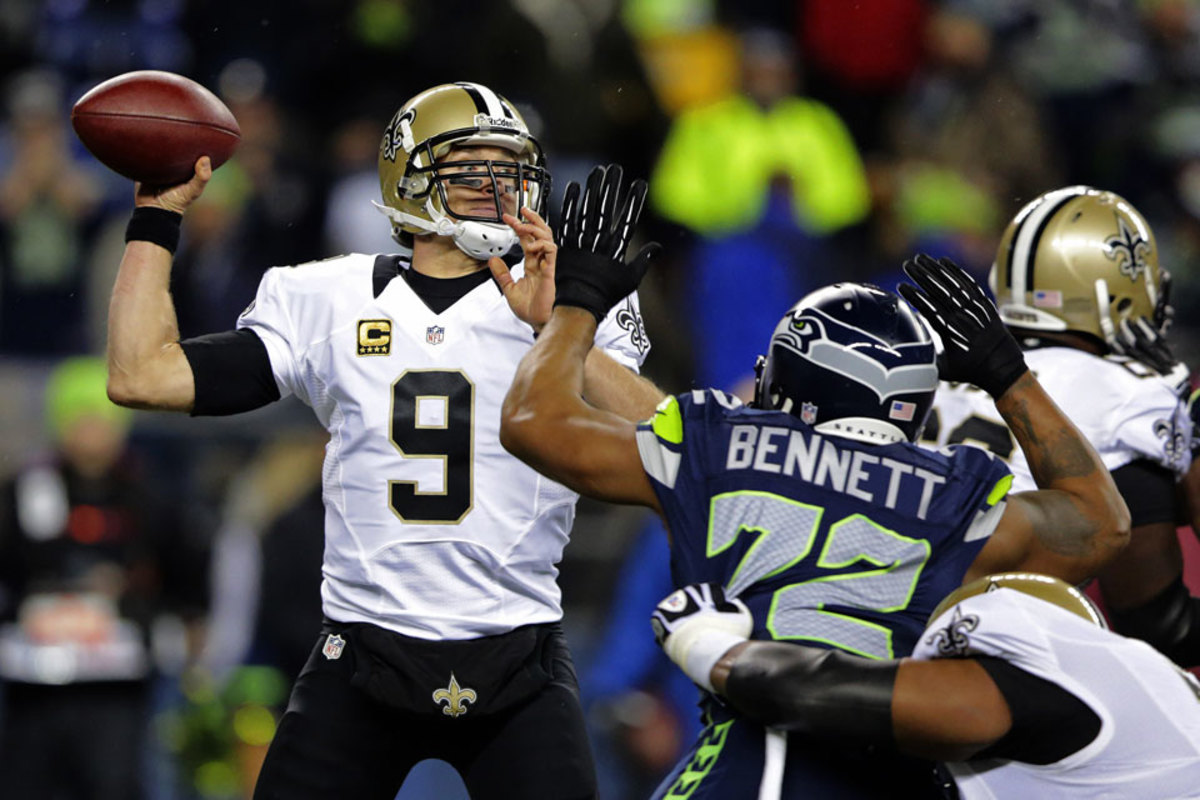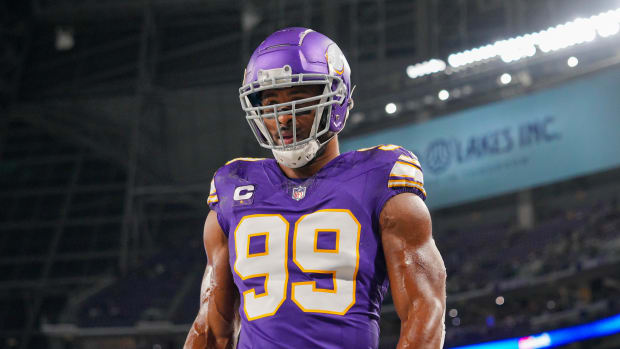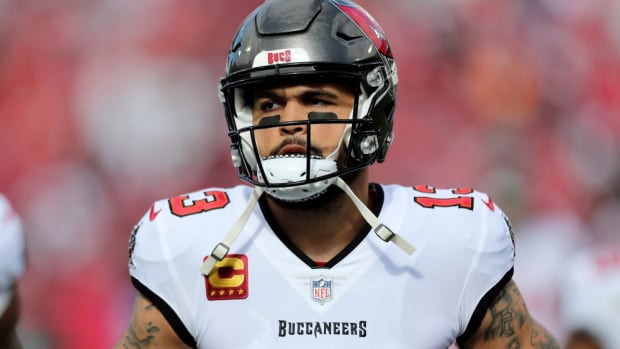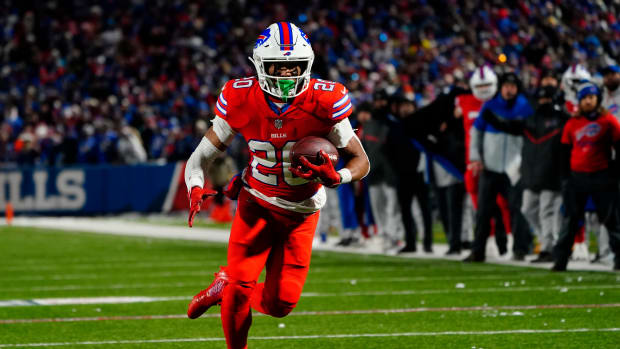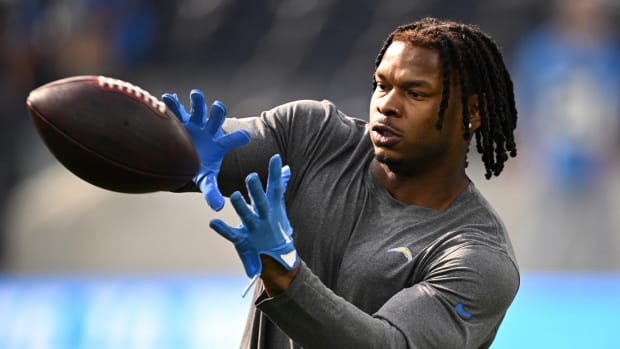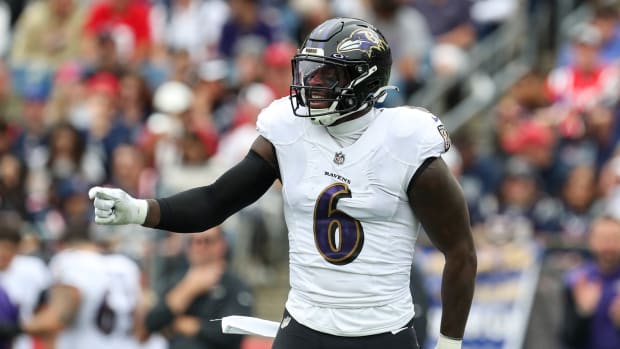Weekend Slate: Analyzing Divisional Matchups
Saints (12-5; sixth seed) at Seahawks (13-3; first seed)
Saturday, 4:35 p.m. ET, FOX
Saints offense vs. Seahawks defense
Schematically, the Seahawks did nothing unique in their last meeting with the Saints. Pete Carroll’s defense just played with exceptional speed and ferocity. The best way to defend the Saints is to press their outside receivers one-on-one, creating a more crowded zone inside, where most of the route combinations are focused (think Marques Colston or Jimmy Graham working down the seam). The Seahawks’ hybrid press-man and single-high zone scheme naturally employs this formula.
Of course, if there were a golden formula that consistently stymied Sean Payton’s aerial designs, New Orleans’ offense wouldn’t have finished first in total yardage in four of the past eight seasons. It finished fourth in yardage this year, and it’s certainly capable of making the necessary adjustments to have success in this rematch with Seattle.
One of the adjustments will be to simply block better. Drew Brees was under constant duress in the first matchup and played a tad hurried. A few weeks later, Payton replaced left tackle Charles Brown with Terron Armstead, which is paying off, as the third-round rookie has shown dramatic improvement in each of his past three outings. Armstead will still need help against sinewy edge rushers Chris Clemons and Cliff Avril, but at least his quarterback can trust his backside protection on five-step drops now.
Seahawks offense vs. Saints defense
Amidst all the buzz about the Seahawks’ thunderous home-field advantage and their 34-7 stomping of the Saints in Week 13, people have failed to notice that Russell Wilson and this offense sputtered down the stretch. Following that Saints game, the Seahawks were held to 17 points in a loss at San Francisco. The next week, Wilson & Co. were choppy in a 23-0 win at New York that was totally driven by the defense. Following that, a 17-10 loss at home against the Cardinals. And against the Rams in Week 17, the Seahawks offense had 20 points and four three-and-outs (plus a four-and-out).
With his line quivering in pass protection, Wilson has been uncharacteristically jittery in the pocket. Too often he’s looked to flee after hastily breaking off his early progressions. Now he’s facing a Saints defense that loves to threaten pressure, only to drop back and play sound coverage-based concepts behind a three- or four-man rush. Wilson will find trouble if he doesn’t start playing with more patience. Look for offensive coordinator Darrell Bevell to get his young quarterback comfortable by featuring moving-pocket and play-action. That’s also a great way to leverage Marshawn Lynch and the dynamic zone-rushing attack.
Colts (12-5, fourth seed) at Patriots (12-4, second seed)
Saturday, 8:15 p.m. ET, CBS
Colts offense vs. Patriots defense
Andrew Luck gave one of the best individual performances in NFL history last week. His three interceptions were his only bad throws. The rest of the game, Luck sliced up the Chiefs' man-based defense by extending plays from the pocket. When the Chiefs went to more double-high safety off-coverage concepts, Luck employed a rapid-paced hurry-up. He precociously identified which wide receivers out of three-wideout sets would draw favorable matchups against one of those two-high safeties. (Best example: the game-winning touchdown; T.Y. Hilton ran a fly route from the slot that exploited Kansas City’s “quarters” coverage by forcing an ill-equipped Kendrick Lewis to pick up the streaking receiver one-on-one from an unfavorable angle downfield.)
Luck is facing another man-based defense this week, but Indy’s route combinations won’t produce the same playmaking opportunities. The Patriots are too conservative to be out-leveraged downfield. Plus, their personnel is better than the Chiefs’. Aqib Talib, at 6-1, 205 pounds, has the length, strength and fluidity to disrupt the 5-9, 180-pound Hilton. And the Pro Bowl corner almost certainly will have help over the top, as Bill Belichick’s M.O. is to do whatever is necessary to eliminate the opponent’s top weapon.
With Hilton covered and offensive coordinator Pep Hamilton finally acknowledging (tacitly) the ineffectiveness of Trent Richardson and the power running game, this contest will be decided by Indy’s ancillary receivers in spread sets. The game plan will focus on quick-timing throws, but a lot will hinge on what happens when Luck extends plays. The X-factor: tight end Coby Fleener. He’ll either be matched against a linebacker in space or shadowed by corner-turned-safety Devin McCourty. If it’s the former, Fleener needs to have a 100-yard type night. If it’s the latter, then either Griff Whalen, Da’Rick Rogers or speedster LaVon Brazill will have to win in true one-on-one scenarios.
Patriots offense vs. Colts defense
Tom Brady’s quick delivery and New England’s underneath man-beater route designs will render Robert Mathis a nonfactor on most plays. That is, unless the Colts corners can challenge receivers out of stack release and trips-bunch alignments, preventing Brady from throwing on a three-step drop. Vontae Davis has the strength and short-area athletic prowess to do this, but do Darius Butler and Josh Gordy? This secondary did a very good job playing releases and identifying coverage responsibilities against similar concepts in the second half against the Chiefs. They’ll have to be even sharper against the Patriots, who have a far better quarterback and play at a faster pace.
New England’s passing attack is brilliant in the way it forces inside linebackers into the coverage equation. The Colts aren’t overflowing with talent at this position, but they’ve finally settled on a stable rotation, with undrafted rookie Josh McNary now the nickel ’backer alongside the ascending Jerrell Freeman. How soundly these two play often determines how well this defense plays.
Another determinant is Antoine Bethea, who has been huge in a multifaceted role down the stretch. Besides being the lynchpin in a lot of defensive coordinator Greg Manusky’s blitz packages, the eighth-year safety is a fast, instinctive run-stopper and highly intelligent zone cover artist. Bethea’s best work often goes unseen, as he consistently prevents quarterbacks from pulling the trigger on downfield throws.
49ers (13-4, fifth seed) at Panthers (12-4, second seed)
Sunday, 1:05 p.m. ET, FOX
49ers offense vs. Panthers defense
Colin Kaepernick ran wild last week in large part because John Harbaugh and offensive coordinator Greg Roman featured horizontally stretched route combinations that compelled the Packers to widen their zones. The goal of doing that might have been to create more isolation reads in the passing game, but it also opened running lanes.
The Panthers, who have been a stout zone-based defense all season, have a more challenging front four (plus athletic linebackers in Luke Kuechly and Thomas Davis) who can contend with the long-striding quarterback. It’s highly unlikely Kaepernick will have enormous success scrambling again.
The Niners will try to distort the Panthers’ zone spacing by using unbalanced base sets, with two receivers lined up to one side and a traditional tight end closing the formation on the other. This will effectively slice the field in half, giving Kaepernick simpler defined reads—something he needs, as he’s not nearly as comfortable dissecting zone coverage as he is man-to-man.
That discomfort against zone was apparent when these teams met in Week 10, when Kaepernick was repeatedly late on throws. He finished with just 91 yards passing and lost 45 yards on six sacks. San Fran’s only bright spot that day was Frank Gore, who rushed for 82 yards on 16 carries, most of it up the middle. That will have to be the fulcrum of San Fran’s game plan this week.
Panthers offense vs. 49ers defense
Cam Newton is essentially just a slightly more refined version of Kaepernick. He’s made some sensational plays late in games over the past few weeks, but all the pocket passing inconsistencies that we highlighted in early December have remained, if not intensified. Those inconsistencies could show up in an ugly way if go-to receiver Steve Smith is ineffective coming off a Week 16 knee injury.
Healthy or not, Smith will face regular double teams. So will at least one other Panther. Reason being, San Fran’s increasingly explosive four-man rush forces the offense to keep an extra blocker in on pass protection. The Panthers have done this all year because, like the Packers, their offensive tackles (Jordan Gross and Byron Bell) struggle to hold ground against dynamic bull-rushers. If the offense has six to block four in the trenches, then the defense has seven to guard four downfield. Or, in this case, seven to guard five, given that the Niners might defend Newton with a lurker (last time it was linebacker NaVorro Bowman, with safety Donte Whitner assuming Bowman’s man coverage assignments on running backs.)
At Green Bay, with a four-man rush creating a numbers advantage, the Niners were tremendous in their staple “two-man” concepts (that is, two safeties deep, with everyone else playing man-to-man). They’ll feature that again this week, but they’ll also incorporate an array of tactical changeups to keep Newton guessing. They confounded the third-year quarterback with a rotation of zone and hybrid man-spy tactics in the last meeting. To stabilize the action, Panthers offensive coordinator Mike Shula must stay committed to screens and the ground game.
Chargers (10-7, sixth seed) at Broncos (13-3, first seed)
Sunday, 4:40 p.m. ET, CBS
Chargers offense vs. Broncos defense
San Diego’s transformation to a spread offense under Mike McCoy has paid dividends, but this team crashed the playoff party by committing to the run. The rushing stats from San Diego’s five-game winning streak tell the story:
Week 14: 40 runs for 144 yards vs. the Giants
Week 15: 44 for 177 at Denver
Week 16: 37 for 148 vs. Oakland
Week 17: 36 for 186 vs. Kansas City
Wild Card: 40 for 196 at Cincinnati
So what will the Chargers do this Sunday? Their offensive line showed great power and cohesiveness in zone blocks against a Bengals’ front seven that’s stingier than the Broncos’. If Ryan Mathews is healthy (and maybe even if he’s not, given that Ronnie Brown and Danny Woodhead were effective when Mathews sat out the second half last week), a methodical ground game will shorten this contest and keep the score artificially close. Those are key ingredients for an upset.
Broncos offense vs. Chargers defense
Yes, John Pagano’s defense stymied Peyton Manning in San Diego’s upset at Mile High four weeks ago. But keep in mind, that was a Thursday game and Wes Welker was out. Manning, who thrives on preparation, had only three days to adjust from a three-receiver based offense that centers around slot option routes to a two-tight end based offense that used more isolation routes. And with Welker out, Eric Decker worked more in the slot, which meant Manning’s No. 2 receiver was out of position. Plus, the Chargers offense controlled the time of possession and built just enough of a lead to discourage Manning from audibling to the run.
Welker is back now, and Manning has had two weeks to rest up and prepare for an opponent that he’ll be seeing for the fifth time in less than two years. It’s doubtful he’ll be confounded by Pagano’s crafty, well-timed coverage disguises the same way Andy Dalton was. Which means San Diego’s defense will have to out-execute the most prolific offense in NFL history. That’s a tall order even for a white-hot D that’s playing extremely sound football.
































